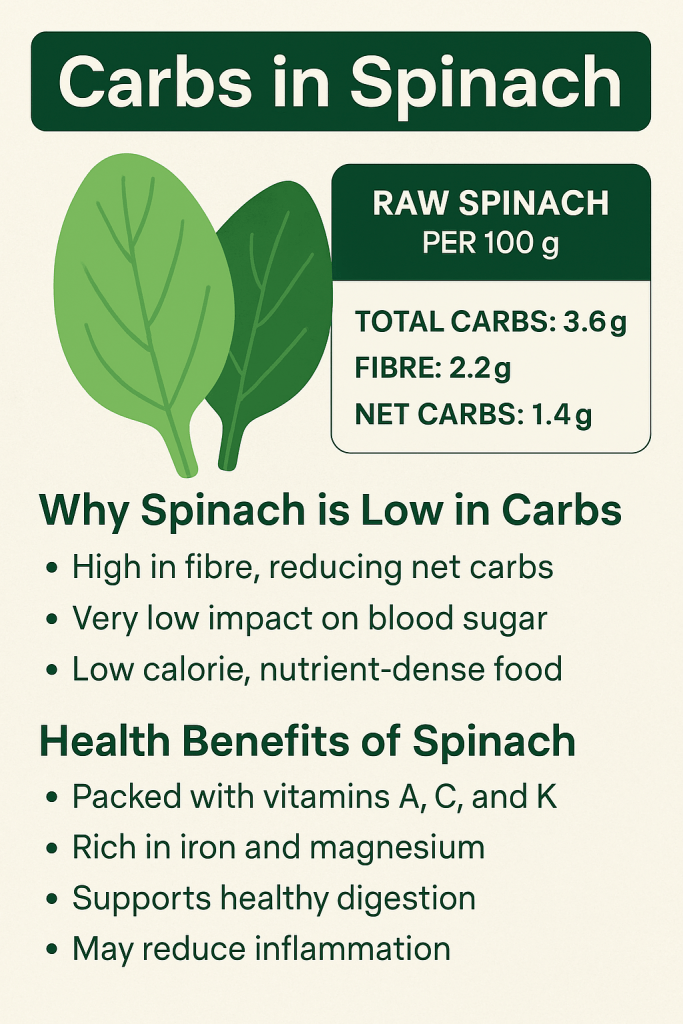Carbs in Spinach: The Truth Behind This Leafy Green’s Nutritional Power
Carbs in spinach might not be something you’ve really thought about — but if you’re tracking your nutrition, especially your carbohydrates, it’s good to know what you’re working with. Spinach, after all, is one of the most popular leafy greens out there, and it’s often recommended in everything from low-carb to high-protein diets.
So how many carbs does it really have? And does it matter when you’re trying to stay healthy?
Let’s break it down.
What Makes the Carbs in Spinach So Unique?
Spinach is one of those rare foods that delivers a lot nutritionally, while giving you barely any carbohydrate load. Per 100g of raw spinach, you’ll find just 3.6g of total carbs — but here’s the clever bit: almost half of that is fibre.
That means:
- Net carbs are low – Around 1.4g per 100g, which is perfect for low-carb diets
- High fibre content – Great for gut health and blood sugar control
- Packed with vitamins – Especially vitamin K, A, and folate
- Rich in iron and magnesium – Helping you maintain energy levels and muscle function
Thanks to this unique nutrient-to-carb ratio, spinach has become a firm favourite in keto, paleo, vegan, and clean-eating circles alike.
Why Carbs in Spinach Are a Good Thing
You might think all carbs are bad. Not true. Carbohydrates like those in spinach are the kind your body loves — slow-digesting, fibre-rich, and packed with nutrients.
- Energy support: Even in small amounts, the natural carbs in spinach can give your body a gentle energy lift without spiking blood sugar.
- Digestive health: The insoluble fibre helps food move through your system smoothly.
- Blood sugar balance: Low net carbs + fibre = fewer crashes and better insulin response.
- Nutrient synergy: Spinach carbs come bundled with antioxidants and minerals, making them a smart addition to almost any diet.
It’s a great example of how not all carbs are created equal. In fact, the right carbs — like the ones in spinach — can actually help you reach your health goals.
What the Research Says About Carbs in Spinach
Ongoing research has shown that non-starchy, low-carb vegetables like spinach play a key role in reducing inflammation, improving heart health, and supporting healthy blood sugar levels.
Studies have also shown that pairing iron-rich foods (like spinach) with a small amount of healthy carbs increases absorption — so eating spinach in a balanced meal does your body plenty of favours.
Additionally, people on low-carb diets have reported better overall diet satisfaction when leafy greens like spinach are included regularly.
Easy Ways to Add More Spinach to Your Diet
Spinach is incredibly versatile. Whether you like it raw, sautéed, or blended — it fits into your routine with zero fuss.
Here are some easy ideas:
- Toss it into your morning smoothie with banana and almond butter
- Mix into scrambled eggs or omelettes
- Stir through soups, stews, or curries right before serving
- Use as a base for salads instead of iceberg lettuce
- Bake into savoury muffins or add to lasagne layers
Cooking tip: Light steaming or sautéing actually makes some nutrients more bioavailable — so you’re not losing out by cooking it.
Are There Any Downsides?
Very few. However, spinach does contain oxalates, which in large amounts can inhibit calcium absorption or contribute to kidney stones in some sensitive individuals. If that’s a concern for you, vary your greens and stay hydrated.
That said, for the majority of people, spinach is a safe, beneficial, and nutrient-dense choice.
Final Thoughts: Should You Worry About Carbs in Spinach?
Absolutely not.
The carbs in spinach are minimal, balanced by fibre, and loaded with health-promoting nutrients. It’s the kind of carb source you want more of — not less.
Whether you’re watching your macros, eating clean, or just trying to feel better day to day, spinach is a simple, smart choice. Low in calories, high in nourishment, and easy to prep. What’s not to love?
If you’ve been overlooking this leafy legend because of its carb count, it’s time to welcome it back to your plate.
Want more green goodness in your routine? Explore our guide to well-being nutrition for daily greens.






